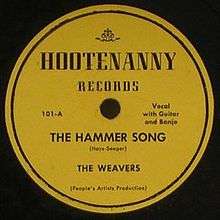If I Had a Hammer
| "The Hammer Song" | |
|---|---|
 Original 1950 release by The Weavers on Hootenanny Records, 101-A. | |
| Single by The Weavers | |
| B-side | "Banks of Marble" |
| Released | 1950 |
| Format | Vinyl single |
| Genre | Folk |
| Label | Hootenanny |
| Songwriter(s) |
Pete Seeger Lee Hays |
| "If I Had a Hammer" | ||||
|---|---|---|---|---|
 Single by Peter, Paul and Mary | ||||
| Single by Peter, Paul and Mary | ||||
| from the album Peter, Paul and Mary | ||||
| B-side | "Gone the Rainbow" | |||
| Released | 1962 | |||
| Format | Vinyl single | |||
| Genre | Folk | |||
| Length | 2:11 | |||
| Label | Warner Bros. | |||
| Songwriter(s) |
Pete Seeger Lee Hays | |||
| Producer(s) |
Albert Grossman Milt Okun | |||
| Peter, Paul and Mary singles chronology | ||||
| ||||
| "If I Had a Hammer" | ||||
|---|---|---|---|---|
 Single by Trini Lopez | ||||
| Single by Trini Lopez | ||||
| from the album Trini Lopez at PJ's | ||||
| B-side | "Unchain My Heart" | |||
| Released | 1963 | |||
| Format | Vinyl single | |||
| Genre |
Folk Pop | |||
| Length | 2:59 | |||
| Label | Reprise | |||
| Songwriter(s) |
Pete Seeger Lee Hays | |||
| Producer(s) | Don Costa | |||
| Trini Lopez singles chronology | ||||
| ||||
"If I Had a Hammer (The Hammer Song)" is a song written by Pete Seeger and Lee Hays. It was written in 1949 in support of the progressive movement, and was first recorded by The Weavers, a folk music quartet composed of Seeger, Hays, Ronnie Gilbert and Fred Hellerman. It was a number 10 hit for Peter, Paul and Mary in 1962 and then went to number three a year later when recorded by Trini Lopez.
The Weavers released the song under the title "The Hammer Song" as a 78 single in March 1950 on Hootenanny Records, 101-A, backed with "Banks of Marble".
Early versions
The song was first performed publicly by Pete Seeger and Lee Hays on June 3, 1949, at St. Nicholas Arena in New York City at a testimonial dinner for the leaders of the Communist Party of the United States, who were then on trial in federal court, charged with violating the Smith Act by advocating the overthrow of the U.S. government.[1] It was not particularly successful in commercial terms when it was first released. It was part of the three songs Seeger played as the warm-up act for Paul Robeson's September 4 concert near Peekskill, New York, which subsequently erupted into a riot.[2]
Hit versions
It fared notably better in commercial terms when it was recorded by Peter, Paul and Mary a dozen years later. Their cover of the song, released in July 1962 off the group's debut self-titled album, became a Top 10 hit, and won the Grammy Awards for Best Folk Recording and Best Performance by a Vocal Group. Trini Lopez's 1963 single went to number three on the same Billboard chart. It was included on his album, Trini Lopez at PJ's (Reprise R/RS 6093).[3]
Other versions
- Johnny Cash released the song on his album Any Old Wind That Blows in 1972. Also released as a single, the song hit number 29 on the US country chart.
- Wanda Jackson released the song as a single in 1969. It was included on her album The Many Moods of Wanda Jackson. It reached number 41 on the US country chart.
Legacy
The song "If I Had a Hammer" was a Freedom Song of the Civil Rights Movement.
Wikileaks chose the song as its "Wikileaks song".[4]
References
- ↑ "Town Talk," The Daily Worker, June 1, 1949
- ↑ Frillmann, Karen. "Today in History: Peekskill Riots". WYNC (New York), 4 September 2009. Accessed 25 January 2015.
- ↑ Gilliland, John (1969). "Show 21 - Forty Miles of Bad Road: Some of the best from rock 'n' roll's dark ages. [Part 2]" (audio). Pop Chronicles. University of North Texas Libraries. Track 2.
- ↑ "Inspirational Material".